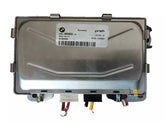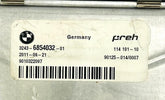Introduction
When your car’s air conditioning starts blowing warm air, one of the most common causes is a refrigerant (gas) leak—often originating from the AC compressor. The AC compressor plays a crucial role in keeping your car cool by circulating refrigerant throughout the system. Over time, leaks can develop due to worn seals, physical damage, or corrosion.
Detecting an AC gas leak early can save you from costly repairs and keep your system working efficiently. In this blog, Automan Spare Parts guides you step-by-step on how to check for a gas leak in a vehicle AC compressor using various methods, from simple visual inspections to advanced tools.
Why AC Gas Leaks Happen
Before diving into the detection process, it's helpful to understand what might cause a leak in the first place.
-
Aging seals or gaskets
-
Cracks or corrosion in compressor housing
-
Loose or damaged hose fittings
-
Excessive vibration or heat
Even a tiny leak can cause your AC system to lose efficiency, leading to poor cooling and increased wear on the compressor.
How to Detect a Gas Leak in Your AC Compressor
There are several ways to detect a refrigerant leak, depending on the tools available and the severity of the issue. Below are the most effective methods:
1. Visual Inspection
Start with a basic visual check under the hood:
-
Look at the AC compressor housing, especially around joints and hose connections.
-
Inspect for oil stains, damp spots, or residue — refrigerant often escapes with a small amount of compressor oil.
-
Check O-rings and seals for signs of aging or cracks.
This method is simple but may not be sufficient for detecting small or slow leaks.
2. Listen for a Hissing Sound
Turn off the engine and listen carefully near the compressor area.
A faint hissing or bubbling sound might indicate escaping refrigerant. This typically only happens during an active leak and is rare unless the hole is substantial.
3. Soap and Water Spray Test
This classic method can help spot visible leaks:
-
Mix dish soap and water in a spray bottle.
-
Spray generously over the compressor joints, pressure valves, and hose fittings.
-
Watch for bubbles forming — this is a clear sign of a leak.
This test is safe and inexpensive but may not detect smaller leaks.
4. UV Dye Test
The UV dye method is a professional and highly accurate way to detect AC leaks.
Steps:
-
Add fluorescent dye to the AC system using a UV dye injector.
-
Run the AC for 10–15 minutes to circulate the dye throughout the system.
-
Use a UV flashlight to scan around the compressor, hoses, and fittings.
-
Look for bright green or yellow dye at the leak point.
Always wear protective eyewear and gloves when handling UV dye.
5. Electronic Leak Detector
This tool is commonly used by mechanics and quickly detects refrigerant gases.
-
Move the sensor around compressor joints, hoses, and service valves.
-
If refrigerant is detected, the tool will emit a beep or light signal.
-
Ideal for finding small leaks that are invisible to the eye.
Electronic detectors are more sensitive and reliable than basic methods.
6. Nitrogen Pressure Test (Advanced)
If the system is empty or evacuated, mechanics can use this method:
-
Fill the AC system with dry nitrogen using a manifold gauge.
-
Observe pressure drop over time.
-
Use soap solution on joints to find where gas is escaping.
This test is typically done at a workshop due to the specialized equipment required.
Does a Refrigerant Leak Have a Smell?
One of the most common questions car owners ask is whether you can smell a refrigerant gas leak from your vehicle’s AC system.
In most cases, the answer is no.
Refrigerants like R134a and R1234yf, which are commonly used in modern vehicles, are:
-
Odorless or faintly sweet-smelling
-
Colorless and non-flammable (in normal conditions)
-
Difficult to detect by smell alone
However, in rare cases, a slightly sweet, chemical, or chloroform-like smell might be noticeable if the leak is substantial. If you do smell something unusual, it’s best to have the system inspected immediately, as inhaling refrigerant in enclosed spaces can be harmful.
Other Unusual AC Smells and What They Mean
Sometimes, what you’re smelling is not refrigerant at all. Here are a few possibilities:
| Smell | Likely Cause | Leak-Related? |
|---|---|---|
| Musty or moldy | Mold in evaporator or ducts | No |
| Vinegar or sour | Bacterial growth in vents | No |
| Burning or chemical | Electrical issue or overheating compressor | Possibly |
| Sweet or chloroform-like | Large refrigerant leak | Yes |
If you detect any of these odors, have the AC system diagnosed by a professional mechanic.
Final Thoughts
Checking for a gas leak in a vehicle AC compressor is essential maintenance for keeping your car cool and your AC system efficient. While some leaks are easy to spot, others require more advanced tools like UV dyes or electronic detectors.
If you suspect a leak, it's best to act quickly before the problem gets worse. Ignoring refrigerant leaks can damage your compressor, reduce fuel efficiency, and lead to costly repairs.
At Automan Spare Parts, we offer genuine AC compressors and parts for a wide range of vehicles. If you're replacing your compressor or components, be sure to browse our catalog for competitive prices and fast shipping.







